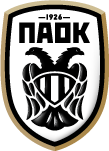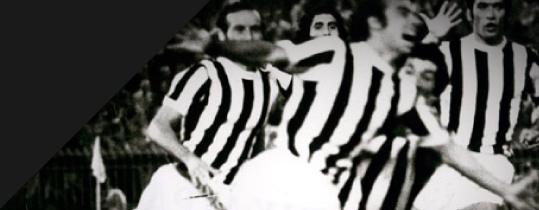Dušan Bajević

Arie Haan’s second spell at Toumba didn’t produce the desired results and the administration led by Giorgos Batatoudis decided to implement a new philosophy and hand the dressroom keys to a commanding coaching figure. After completing his first spell at Olympiacos, Dušan Bajević started his PAOK career at the dawn of the millennium with a 1-1 draw against Panionios at Nea Smyrni. In his second season at the “Double-Headed eagle” and despite the fast-growing administrative problems of the club, he managed to keep the team detached from the crisis –their quest to win the Greek Cup certainly helped to keep them focused.
The Bosnian coach didn’t want to be credited for the Cup win: “This trophy doesn’t belong to just one person, it goes for all PAOK fans. After all that I witnessed here, I don’t want to leave. I saw a 70-year old woman drop in front of the bus wanting to kiss the trophy, I saw people cry. I want to honour my contract with PAOK. However, if the situation doesn’t change, I cannot hang around and fool myself or the team”. The Greek Cup triumph of PAOK in 2001 was also Dušan Bajević’s reply to his critics, as he confirmed his potential once more. He won trophies in all sides he coached.
Ante Čović

In the summer of 1999, Stratos Gidopoulos brought Ante Čović to Tria-Pente Pigadia where PAOK were holding their preseason stage, so that Arie Haan would have his third goalkeeper. Up until the age of 17, he was playing as central forward in Australia.
Born Down Under to Croatian parents, he was vindicated for his decision to switch to goalkeeping and forged a career at Marconi Stallions FC, in Sydney, before moving to PAOK. He was a last-gasp solution and got his opportunity only after Nikos Michopoulos sustained an injury.
He made his debut in the home match against Crvena Zvezda on 17 October 1999 and, one month later, he featured in PAOK’s line-up against Olympiacos in the match that prompted Bajević’s exit from the “red-and-whites”.
In December 1999, PAOK scouted the market for another goalkeeper and Čović was shipped on loan to Kavala for six months. He wasn’t even included in the 18-men squads and his disappointment led him to file a petition to be released of his contract. However he signed a new deal with PAOK in December 2001. Kyriakos Tochouroglou’s injury just before the Greek Cup final handed him another opportunity: “At first I was very stressed, but Tochouroglou helped me a lot. Both he and I were born in Australia, we have been together since the beginning and he gave me valuable pointers for the final. He knew Olympiacos players well, having played with them, and he helped me. When I entered the pitch, everything was different and I was overwhelmed by the fans of PAOK”.
Pantelis Kafes

He was the longest-serving player of PAOK in the final of Nea Filadelfia, having joined the “Double-Headed Eagle” in January 1997 from Pontii Veria. In his first two seasons at Toumba he would usually come off the bench. He became a regular under Angelos Anastasiadis. He kept his spot in the starting eleven during the reigns of Arie Haan and Dušan Bajević, establishing himself as screening midfielder.
Before the Greek Cup final, he talked about the importance of an eventual win for the team. Prior to the showdown against Olympiacos, he got a tattoo with PAOK’s colours on his arm and showed it during the trophy celebration at an Athens’ night club, when he stepped on the stage to sing along Despina Vandi.
Apart from winning the 2000-01 Greek Cup, he also played in 45 encounters that season (between league, cup and European competition) and netted 6 goals. He participated in 12 of PAOK’s 17 matches in the Greek Cup, missing out just on group stage games.
He remained at PAOK until the summer of 2003, contributing also to PAOK’s Greek Cup final win over Aris at Toumba a few weeks earlier. He continued his career at Olympiacos and AEK.
Giorgos Georgiadis

After one season spent in England at the ranks of Newcastle United, Giorgos Georgiadis returned to Greece and signed for PAOK. He starred in the “Double-Headed Eagle’s” triumphant run to the 2001 final and was equally important in the showdown against Olympiacos at Nea Filadelfia. Dimitris Nalitzis was the team’s top scorer in the competition (8 goals in 11 matches), but Georgiadis netted six goals, the most important ones in the knock-out matches. Most of them paved the way to qualification at the expense of SKODA Xanthi and Apollon. In the final, he made it 3-0 in the second half and practically put an end to any Olympiacos’ desire to claw their way back into the contest.
He remained a star of the squad. In 2003, he secured qualification at the expense of Olympiacos in the quarter-finals netting goals both at home and away. He also scored the decider of the final, completing a great season that saw him top the scoring charts of PAOK, all competitions included, with 18 goals in 43 encounters.






































